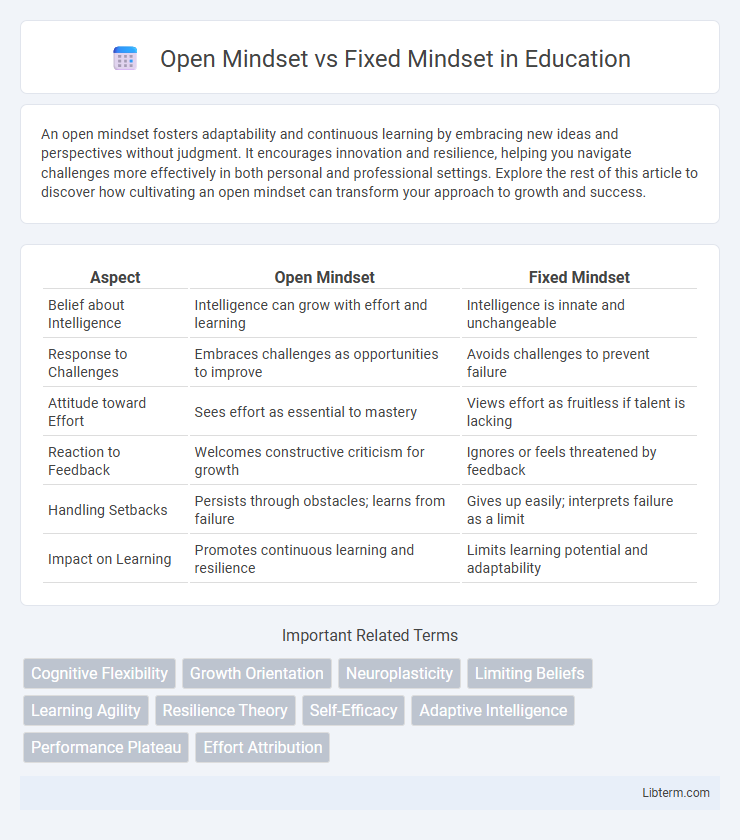An open mindset fosters adaptability and continuous learning by embracing new ideas and perspectives without judgment. It encourages innovation and resilience, helping you navigate challenges more effectively in both personal and professional settings. Explore the rest of this article to discover how cultivating an open mindset can transform your approach to growth and success.
Table of Comparison
| Aspect | Open Mindset | Fixed Mindset |
|---|---|---|
| Belief about Intelligence | Intelligence can grow with effort and learning | Intelligence is innate and unchangeable |
| Response to Challenges | Embraces challenges as opportunities to improve | Avoids challenges to prevent failure |
| Attitude toward Effort | Sees effort as essential to mastery | Views effort as fruitless if talent is lacking |
| Reaction to Feedback | Welcomes constructive criticism for growth | Ignores or feels threatened by feedback |
| Handling Setbacks | Persists through obstacles; learns from failure | Gives up easily; interprets failure as a limit |
| Impact on Learning | Promotes continuous learning and resilience | Limits learning potential and adaptability |
Understanding Mindsets: Open vs Fixed
Understanding mindsets involves recognizing that an open mindset embraces challenges, learning opportunities, and feedback as paths to growth. In contrast, a fixed mindset assumes abilities and intelligence are static, leading to avoidance of obstacles and resistance to change. This fundamental difference shapes motivation, resilience, and overall personal and professional development.
Core Characteristics of an Open Mindset
An open mindset embraces challenges and views failures as opportunities for growth, fostering resilience and continuous learning. It thrives on curiosity, seeking feedback and new perspectives to enhance personal and professional development. This mindset prioritizes adaptability, encouraging innovation and collaboration across diverse environments.
Core Traits of a Fixed Mindset
A fixed mindset centers on the belief that intelligence and abilities are static, leading individuals to avoid challenges and give up easily when faced with obstacles. People with this mindset often perceive effort as fruitless and ignore constructive criticism, limiting their potential for growth. This core trait results in a preference for comfort zones and a reluctance to embrace new learning opportunities.
The Science Behind Mindsets
The science behind mindsets reveals that an open mindset, also known as a growth mindset, activates neural plasticity, allowing the brain to adapt, learn, and develop new skills throughout life. Research by psychologist Carol Dweck demonstrates that individuals with a growth mindset embrace challenges and persist through failure, leading to improved performance and motivation. In contrast, a fixed mindset limits learning potential by reinforcing rigid beliefs about innate abilities, often resulting in avoidance of challenges and decreased resilience.
How Mindsets Influence Learning and Growth
Open mindset fosters continuous learning by embracing challenges and viewing failures as opportunities for improvement, enhancing cognitive flexibility and resilience. Fixed mindset limits growth by assuming intelligence and abilities are static, which often leads to avoidance of difficulties and reduced motivation to develop new skills. Research shows learners with an open mindset exhibit higher achievement and adaptability, directly influencing personal and professional growth trajectories.
Impact on Relationships and Communication
An open mindset fosters empathy, active listening, and adaptability in relationships, leading to more effective communication and deeper connections. Individuals with a fixed mindset often struggle with feedback and defensive communication, which can create misunderstandings and hinder relationship growth. Embracing an open mindset encourages collaboration and mutual respect, essential for healthy interpersonal dynamics.
Mindsets in the Workplace and Career Development
An open mindset in the workplace fosters continuous learning, adaptability, and resilience, leading to enhanced problem-solving and innovation. Employees with an open mindset embrace feedback and view challenges as opportunities for growth, which accelerates career development and increases job satisfaction. Conversely, a fixed mindset limits professional progress by creating resistance to change and fear of failure, hindering both individual and organizational growth.
Strategies to Develop an Open Mindset
Cultivating an open mindset involves embracing challenges and viewing failures as opportunities for growth, supported by consistent self-reflection and feedback-seeking behaviors. Techniques such as setting learning goals instead of performance goals, practicing mindfulness to reduce defensive reactions, and engaging in diverse experiences promote cognitive flexibility. Implementing these strategies encourages adaptability, resilience, and continuous personal development, essential for overcoming the limitations of a fixed mindset.
Overcoming the Limitations of a Fixed Mindset
Overcoming the limitations of a fixed mindset involves embracing a growth-oriented approach where challenges are seen as opportunities for learning rather than threats to one's abilities. Individuals adopting an open mindset actively seek feedback, persist through obstacles, and view effort as a pathway to mastery, which contrasts sharply with the fixed mindset's tendency to avoid failure and resist change. Research by psychologist Carol Dweck highlights that shifting from a fixed to an open mindset significantly enhances resilience, motivation, and achievement across academic, professional, and personal domains.
Real-Life Examples of Mindset Transformation
Real-life examples of mindset transformation often highlight individuals who shifted from a fixed mindset to an open mindset, enabling significant personal and professional growth. For instance, athletes like Michael Jordan embraced failure as a learning opportunity, which fueled their perseverance and ultimate success. Entrepreneurs such as Sara Blakely attribute their achievements to adopting a growth-oriented mentality that promotes continuous learning and resilience in the face of challenges.
Open Mindset Infographic

 libterm.com
libterm.com